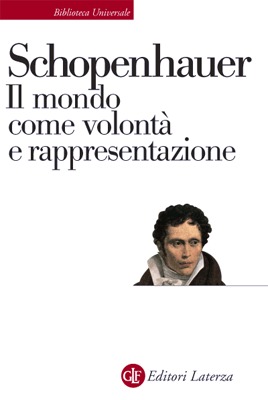List Epithetical Books Il mondo come volontà e rappresentazione
| Title | : | Il mondo come volontà e rappresentazione |
| Author | : | Arthur Schopenhauer |
| Book Format | : | Paperback |
| Book Edition | : | Deluxe Edition |
| Pages | : | Pages: 612 pages |
| Published | : | 2002 by Laterza (first published 1818) |
| Categories | : | Philosophy. Nonfiction. European Literature. German Literature. Classics. Literature. 19th Century. Canon. History |

Arthur Schopenhauer
Paperback | Pages: 612 pages Rating: 4.2 | 902 Users | 59 Reviews
Narration Toward Books Il mondo come volontà e rappresentazione
Il mondo come volontà e rappresentazione resta ancor oggi la testimonianza appassionante e illuminante di una crisi intellettuale e morale che è ben lontana dall'essere risolta; e chi lo legge con occhio storico può ben riconoscervi uno dei documenti «essenziali» per comprendere l'origine e il significato di talune idee che sono ancora operanti nella filosofia contemporanea, pronte, comunque, a riemergere ogni volta che la storia sembra deludere o sconfiggere.Dall'introduzione di Cesare Vasoli.
Point Books Concering Il mondo come volontà e rappresentazione
| Original Title: | Die Welt als Wille und Vorstellung |
| ISBN: | 8842020796 (ISBN13: 9788842020790) |
| Edition Language: | Italian URL http://www.laterza.it/index.php?option=com_laterza&Itemid=97&task=schedalibro&isbn=9788842020790 |
Rating Epithetical Books Il mondo come volontà e rappresentazione
Ratings: 4.2 From 902 Users | 59 ReviewsJudgment Epithetical Books Il mondo come volontà e rappresentazione
I like his ideas but think they could be a bit more rosy... Why must pessimism and cynicism rule the world?a remarkable kantian criticism, influencing directly on nietzsche's philosophical growth and his conception of the will to power, even on freud's topology of the being. it is, despite its idealist premises borrowed from eastern philosophy at times, a beautiful resketch of western metaphysics

my favorite part in schopenhauer is his discussion of music, in which he qualifies leibnitz's aphorism that music is "an unconscious exercise in arithmetic whereby the mind does not know it is counting" with the claim that music is "the unconscious exercise in metaphysics in which the mind does not know it is philosophizing"... i also like it when he draws parallels between indian philosophy and descartes
One of the most coherent philosophical texts I've ever read. This is an important one because its at a turning point for many fields of science and it clears up a bunch of what Kant wrote. I liked how it was equal parts transcendental idealism but also draws heavily on Buddhism, Christian mysticism and Hinduism. Yet the man comes at it from an atheistic point if view, devoid of thr so called freedom of the will. His definition of the will is unmatched and it's a key tenant of his philosophy and
this book is great but his later "essays and aphorisms" is a more concise and direct expression of his thought.
I like his ideas but think they could be a bit more rosy... Why must pessimism and cynicism rule the world?



No comments:
Post a Comment
Note: Only a member of this blog may post a comment.